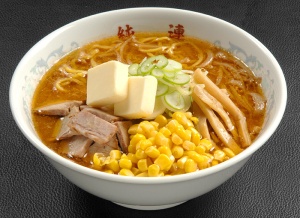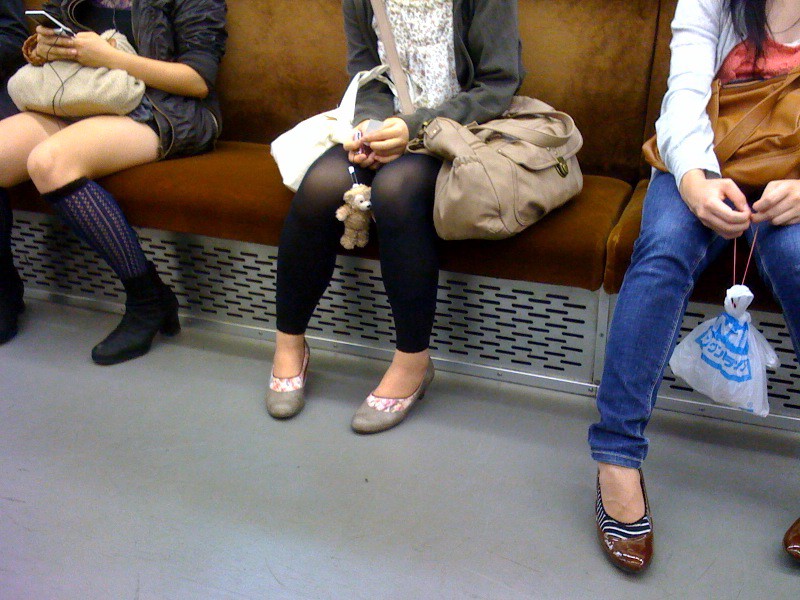…and everything that rode in with it. (Okay, not the food.)

I would never be so arrogant as to say “Fuck [blank]” about any country that was not my own. Luckily my Japanese heritage allows me the opportunity to say: fuck Japan, fuck its culture, fuck its values, fuck most everything about its society… because it needs to be said. Now if I am speaking honestly, of course I realize that each culture has its good and bad, has something unique to offer and can be valued for some — many — reasons or others. Japan is not an anomaly in that sense; there are many wonderful parts of Japanese culture and I am very happy to be Japanese (in no small part due to the food). As we can all learn from other cultures, I think Japan can offer the rest of us some insight into cooperation, striving for excellence, humility, and pride.
But this is not what this post is about. Today I choose to write about a part of Japan that is often absent to the rest of us, that we do not think about before, during, or after we have traveled there, and maybe only passingly when consuming Japanese pop culture. This is not to say that there is not Western analyses of Japanese culture. Only yesterday did I hear on BBC radio a discussion of the population crisis and the potential reasons behind it. There are many feminist analyses that point to sexism in Japanese anime, manga, and gaming culture as well (otaku culture to those interested in learning more about it). But what really makes me express myself so strongly against Japan is not situated in statistics or political understandings of the mechanisms of our society; rather, the day-to-day reality of what it means to be Japanese living in Japan.
Kyoto is a good starting point. Kyoto is the city that I am from. It is known for being the old capital, for having the best cherry blossoms, and for its historical preservation of old temples, shrines, and the like.

Amongst the beauty of Kyoto (my favorite spot being Kamogawa river), you may also notice the beauty of its women — beauty, not subjectively but objectively — the young women of Kyoto are dressed immaculately; hair coiffed, nails trimmed, not a pleat out of place. Like our stereotype of Parisians, it can seem very appealing in a high-fashion, snooty type of way. Japanese women (/people) present themselves very well, and it can be quite a delight to those of us who don’t understand the mechanisms working behind it. There is a reason why it is difficult to spot a unkempt individual in Kyoto, let alone in most metropolitan areas of Japan (except maybe Osaka*); the word is だらしない [da-ra-shi-na-i], and we just don’t do it.
See, “darashinai” (to be sloppy) is something we just don’t do because other people don’t do it. Japan is a society that operates on the basis of shame, and othering. It is quite easy to be an “other” in Japan: not shaving your facial hair, drawing (any) attention towards yourself, being loud, or “dark,” or having any sort of assertive self-expression whatsoever. Social shame is the linchpin of Japanese culture. Being shamed by others around you, in the Japanese collective imagination, is possibly the worst thing that can happen to you. There is a reason why so many people choose suicide as an alternative to ousting themselves as someone who may not be leading a humble and productive life as is expected, or more accurately, proscribed in greater Japanese society.
The shame mechanism works like this: we teach children at a criminally young age that they are to police themselves and each other. For those who exhibit “bad” social behavior, we teach judgement and ostracization — quickly. Japanese television largely comprises of shows that focus solely on laughing at others who do not adhere to social standards and norms — and yes, while it can be highly entertaining to watch (some) people deliberately make a fool out of themselves for the greater humouristic cause, on a slightly deeper level, it can be quite cruel.
The language of Japan itself is laden with ways to distance yourself from others by identifying their appearance or behavior as undesirable. It would be very difficult to explain the nuances of Japanese language here in English, but what I can say is that we learn to communicate with one another through policing, judgemental language. Children as young as 4, 5, in schools can be heard talking to their peers in a very paternalistic and disciplining manner. It is very peculiar to hear a young child say to another something like: “you know people who don’t wash their hands can’t make any friends, right?” (It is kind of a shit example, but it is really, really difficult to translate this particular nuance into the English language). This is not about children mimicking the language they hear from their parents and other adults around them. It is about children learning at such a young age that their behavior is always to be on watch, and in turn that others’ behavior also must be looked upon down the bridge of one’s nose.
The shame element becomes even more insidious when you add in factors such as gender and power. Not unlike many other cultures in the world, women are taught to feel ashamed for… just about anything that has to do with being a woman. We are taught to be ashamed about the shape and size and color of our bodies, about our sexuality (take a look at Japanese porn if you really want to know what we think of women), about our individual thoughts and values. In such an extremely male-oriented society such as Japan, women are very literally meant to be seen and not heard — to the point where a woman being assaulted on a train will not cry out for years and years of socialization not to draw attention to herself or cause “disturbance” to others.
Here is an even better example of how the extremely male-angled framework of society and the imperative upon women to not speak out work together: I was sitting in front of a class of 5-yr-olds once when one of the young male students attempts to lift my dress and touch the inside of my thighs. Despite witnessing the entire incident, the female teachers did not say one. word. to this young boy chastising his behavior, because this is the kind of thing that is too shameful to be addressed, especially by women. The awkward and apologetic laugh/bow was instead employed here, and I had to take it upon myself to tell the boy that it was not appropriate to touch others’ bodies without their permission.
Because women are not meant to speak out about things like this. And women are not meant to do this, or that… we aren’t even meant to enjoy sex even within the most acceptable conditions. Women are meant to be beautiful, and then to be mothers. Women are so socialized in Japan to present themselves in a certain way that their physical compositions are altered. Ever see a bow-legged Japanese woman? That shit is intentional, and unhealthy as fuck.

Dinner conversations can go something like this:
“I saw a woman at the train station today who was so fat! She had to wait in line for the next train because she couldn’t fit. What a burden she is causing to the rest of us.”
While watching TV:
“Oh she is so pretty because she is white (in skin complexion) and has a small face.”
On speaking about co-workers:
“What a stupid burikko bitch. She is so stupid and annoying. I can’t stand her.”
Let me not even get started on what burikko actually entails — to give a general gist let me just say: women are thought to be most attractive when they are “kawaii” (cute); the best way to be kawaii is to act as much as possible like a little girl. What are character traits of little girls? Cute, yes, and naive, innocent, easily manipulated, eager, and dumb (at least in the burikko imagination). Japan’s ideal woman is trapped in a cell padded with schoolgirl uniforms and oversized stuffed rabbits. Sounding rape-y yet? (Good. Because it is.)
I cannot be bothered here to go into full scope of the state of women in Japan, because what can be said can produce volumes. What I can say is that not even in our language do we have words that point to empowerment, self-assuredness, to self-assertiveness. It is not enough to analyze the awkward pedophilic tones in manga or question the existence of games like Rapelay.**
The day-to-day lives of women in Japan are almost entirely constructed, leaving little to no room of dreaming of different possibilities for oneself and one’s future.
The women who are born in, live in, and die in Japan are subject to a reality of living as an animated puppet. I think of my grandmother, and what kinds of dreams and aspirations she must have had as a little girl. At one point they faded away, and she is a now a woman who plans and prepares meals for her husband on a daily basis, despite not liking cooking at all. What about the young women who are at the prime of their potential, who instead of wondering: “What do I want to do? How do I want to live?” are caught trimming themselves at the edges, trimming trimming trimming trimming so they can be “kawaii” and appropriate, just like everybody else? There is not even ONE mainstream, visible form of resistance to the dictates of Japanese society — because of course, any sort of resistance is met with social shame, and collectively, we just don’t “do” that in Japan.
The level of suppression (oppression) in Japan is one of deep, deep concern. And yet because of our success within capitalism it often is not thought of as “too bad.” But it is. I can’t even say that the women in Japan are suffering because to suffer is to feel something that has not been deemed acceptable by the larger society. It is possible, I think, to teach suppression of the soul so much as to make suffering unrecognizable. It is possible to distort humanity to the point where puppetry is the only viable alternative. Japan needs help. And it needs to help itself find some sort of authentic humanity before as Japanese we are sterilized out of any true and meaningful existence. Fuck Japan, yo. Fuck Japan. Fuck Japan. Fuck Japan.
BOOOOOOO!!!

*Osaka is somewhat of an anomaly in Japan. For whatever reason the attitudes are much more lax, people are much more expressive and direct. Because of the unbridled honesty of Osaka culture, people there are often regarded as the niggers of Japan, if we want to make an appropriate Western comparison. (Whaddup mah niggaaaas!! Hahahaha)
**I advise caution when seeking information about this game.
the grass is always greener on the other side 😉
LikeLike
Girl!…. lol It’s Kim 🙂 I miss you!!!! Also, I can’t find your email address. I got a new phone and my whatsapp contacts were gone. We need to catch up like yesterday lol
LikeLike
Girl what’s your number ASAP lol
LikeLike
Here’s my email.. kimberlyfrd2@gmail.com lets exchange numbers there! 🙂
LikeLike
Are you getting my comments? lol I don’t know if they’re going through.
LikeLike